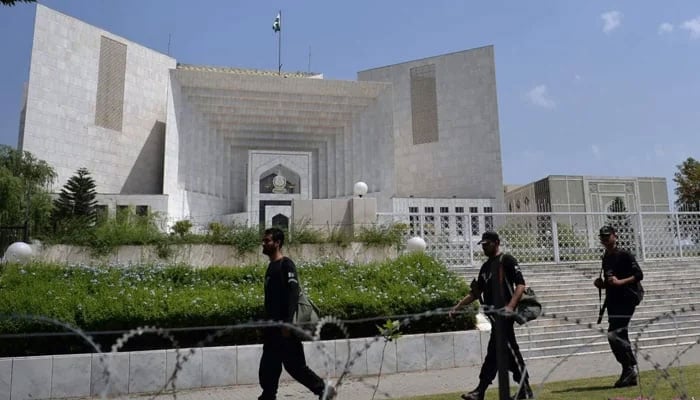'Concrete cases of missing persons': CJP Isa on enforced disappearances
Top judge launches scathing criticism of "private armies" terming such entities "illegal"
ISLAMABAD: In a notable development for the families of those subjected to enforced disappearances, Chief Justice of Pakistan (CJP) Qazi Faez Isa Tuesday acknowledged that there are “concrete cases of missing persons” in the country.
CJP Isa’s remarks came during the hearing of a case, taken up by the apex court following multiple petitions filed by various individuals including prominent lawyer Aitzaz Ahsan, pertaining to missing persons and enforced disappearances in the country.
The case is being heard by a three-member SC bench — comprising CJP Isa, ustice Muhammad Ali Mazhar and Justice Musrat Hilali — court as families of the Baloch missing persons are currently staging a sit-in in Islamabad after arriving in the federal capital last month — following the culmination of their long march that started from Balochistan’s Turbat.
During the hearing, the chief justice launched a scathing criticism of "private armies" in the country while terming such entities as "illegal".
The top judge, while acknowledging the rights of citizens to conduct peaceful demonstrations who were protesting against the disappearances of their loved ones, said: "If we solve it together, the problem of missing persons will be resolved."
Adjourning the hearing till tomorrow (Wednesday), he further said that the court will now ensure the resolution of the missing persons issue, also summoning the Attorney General for Pakistan, Mansoor Usman Awan, to arrive before the bench in the next hearing.
The chief justice also remarked that people in Pakistan often disappear after joining certain organisations, pointing at the anti-state entities present in the country. "The tradition of joining these organisations should end."
He maintained that what is happening in Pakistan does not happen anywhere in the world. CJP Isa insisted that all parties must "accept responsibility" in this matter.
However, he pointed out that the petitions filed by Ahsan reflected a "political" inclination while raising the issue of enforced disappearances, as those named "disappeared" in the petitions were all politicians of a particular political party.
"Your application reflects politics. Don't make it political," CJP Isa said when addressing Shoaib Shaheen, the lawyer representing Pakistan Tehreek-e-Insaf (PTI) in the plea against the enforced disappearances of its members. The chief justice, however, termed them "influential".
"If there is a problem with the influential, they will come themselves," the CJP remarked.
During the hearing of the case, CJP Isa maintained that every institution should stay within its limits. "We thought that the issue of missing persons is important, so we filed a case."
Khushdil Khan Malik, the counsel representing a petitioner of the missing persons, requested that the court order the government to enact legislation related to enforced disappearances.
He complained that the commission to probe the issue was formed under Justice (retd) Javed Iqbal, but it has done nothing to ensure its resolution.
The court, the lawyer said, must ask the government why they it never legislated on the missing persons issue for the last 50 years. Responding to which the CJP Isa said: "How can the court order the Parliament to enact such and such legislation?"
-
Security forces gun down 30 terrorists in multiple IBOs in KP: ISPR
-
MQM-P calls for new province in Sindh
-
US report validates Pakistan military edge over India: PM
-
Banned TTP poses serious threat to Pakistan security: UNSC panel
-
CM Afridi clarifies remarks on by-poll after ECP requests army deployment
-
Dubai sees 3.2m Pakistani passengers in 2025 as airport sets new milestone
-
Security forces kill 23 Indian proxy terrorists in KP's Kurram
-
Pakistan to construct island to boost oil exploration: report












